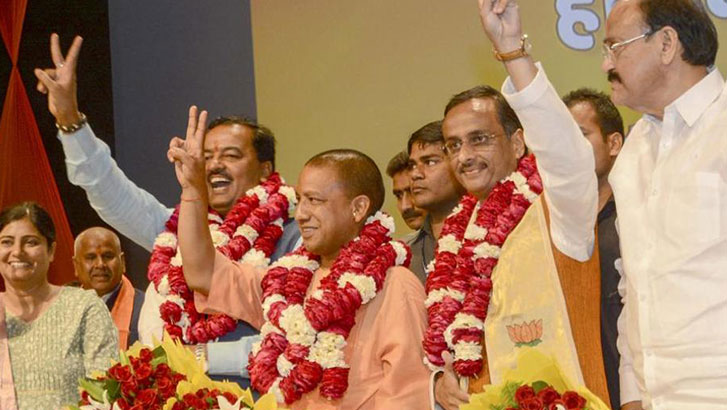COMMUNALISM TRUMPS SOCIAL JUSTICE FOR NOW
After the implementation of Mandal Commission recommendations by the Vishwanath Pratap Singh government at the centre in 1989 it has been only an Other Backward Class or Scheduled Caste leader in Uttar Pradesh at the helm, except for a five years period from 1997 to 2002 when the only Bhartiya Janata Party government formed after the Babri Masjid demolition had two upper caste chief ministers, Ram Prakash Gupta and Rajnath Singh. Post 1989 period was called the era of Social Justice indicating that communities which were not politically well represented or at least not in proportion to their presence in population got a chance to be in power.
A popular slogan of Bahujan Samaj Party was ‘numerically higher should have proportionate participation.’ Before 1989 it was mainly the upper caste, a Brahmin or a Thakur, who headed the governments. The social justice politics was seen as a successful example of empowerment of the marginalised sections of society and Mayawati’s ascension to chief ministership was nothing short of a miracle, probably the rarest example in a democracy where a person hailing from the lowest rungs of society, that too a woman, rose to power based on Constitutional backed electoral process. UP’s example was quoted as a successful model to fight the politics of communalism, for example, in the state of Gujarat. But the reverse has happened.
The politics of communalism has defeated that of social justice. With this is back the upper caste dominance in UP politics. It is an irony but had Yogi Adityanath been declared a chief ministerial candidate before the elections it is not sure whether BJP would have won in an OBC dominated state. To garner the non-Yadav OBC votes Keshav Prasad Maurya was made the BJP President in UP. After the voters were tricked into voting for the BJP an upper caste chief minister has been imposed because that is where the BJP’s core ideology and hence the vote bank lies. However, this vote bank is insufficient to win elections. BJP also went all out to secure the non-Chamar-Jatav votes from among the dalits this time.
The elite BJP supporter is under the illusion that merit will now take precedence over caste, law and order will be better and corruption will come to an end. It is abundantly clear that BJP could not have won without caste machinations and has replaced social justice politics by a retrogressive combination of entrenchment of the pernicious caste system and explosive communalism. The chief minister faces 3 cases including 7 serious Indian Penal Code sections.
He has two charges of promoting enmity between different groups, two charges of injuring or defiling place of worship, one charge of criminal intimidation and more. Once when he was arrested by the District Magistrate of Gorakhpur he wept in the Parliament alleging threat to his life. It did not probably occur to him that victims of violence, inflicted by his followers, or their families similarly may have felt threatened. Deputy chief minister Keshav Prasad Maurya has eleven cases against him including 15 serious IPC sections. 20 out of 44 ministers have cases pending against them with 17 of them facing serious IPC sections. 35 ministers in the newly appointed cabinet are crorepatis. Is it all hard earned money? Did the candidates spend within the limits prescribed by Election Commission to contest their elections? One can only pity the gullible BJP supporter.
BJP secured 39.7% votes. With its allies Apna Dal and Suheldev Bhartiya Samaj Party the vote share of alliance went up to 41.4%. Samajwadi Party and BSP together polled 44% votes. Along with Congress party, the share of secular alliance becomes 50.2% of votes. Hence the politics of social justice still has an upper hand in UP.
In terms of seat share if SP and BSP had formed an alliance, as the then chief minister Akhilesh Yadav of SP had suggested after the Bihar election results, they would have won 239 seats out of 403 and hence would have defeated BJP convincingly. If we add the Congress party votes to this alliance, number of seats would have gone up to 282 and with the inclusion of other like minded parties like the Rashtriya Lok Dal and Communist Party of India, the secular alliance would have won 296 seats. This would have realised Akhilesh Yadav’s aspiration of securing 300 seats with the help of alliance partners.
The abovementioned numbers indicate that the game is still not over for SP and BSP if they open up to each other and revive the Mulayam Singh-Kanshiram era alliance. Mayawati, for whom political oblivion looms large, will have to overcome her antipathy towards the SP and contemplate an alliance. In any case she will not have to deal with Mulayam Singh and Shivpal, of whom she may not have very good memories. Akhilesh is a fresh face and she may not have a problem with him. But Akhilesh will probably have to cede the leadership of alliance to her as she comes from a more depressed background and is a senior leader. This is the sacrifice Akhilesh will have to make if at all he is serious about displacing BJP from power.
The BJP is trying to subvert the Constitutional values of socialism, secularism, sovereignty and even democracy. There is a need for parties and people with belief in such values to come together and defeat the mischievous designs of Hindutva politics.




